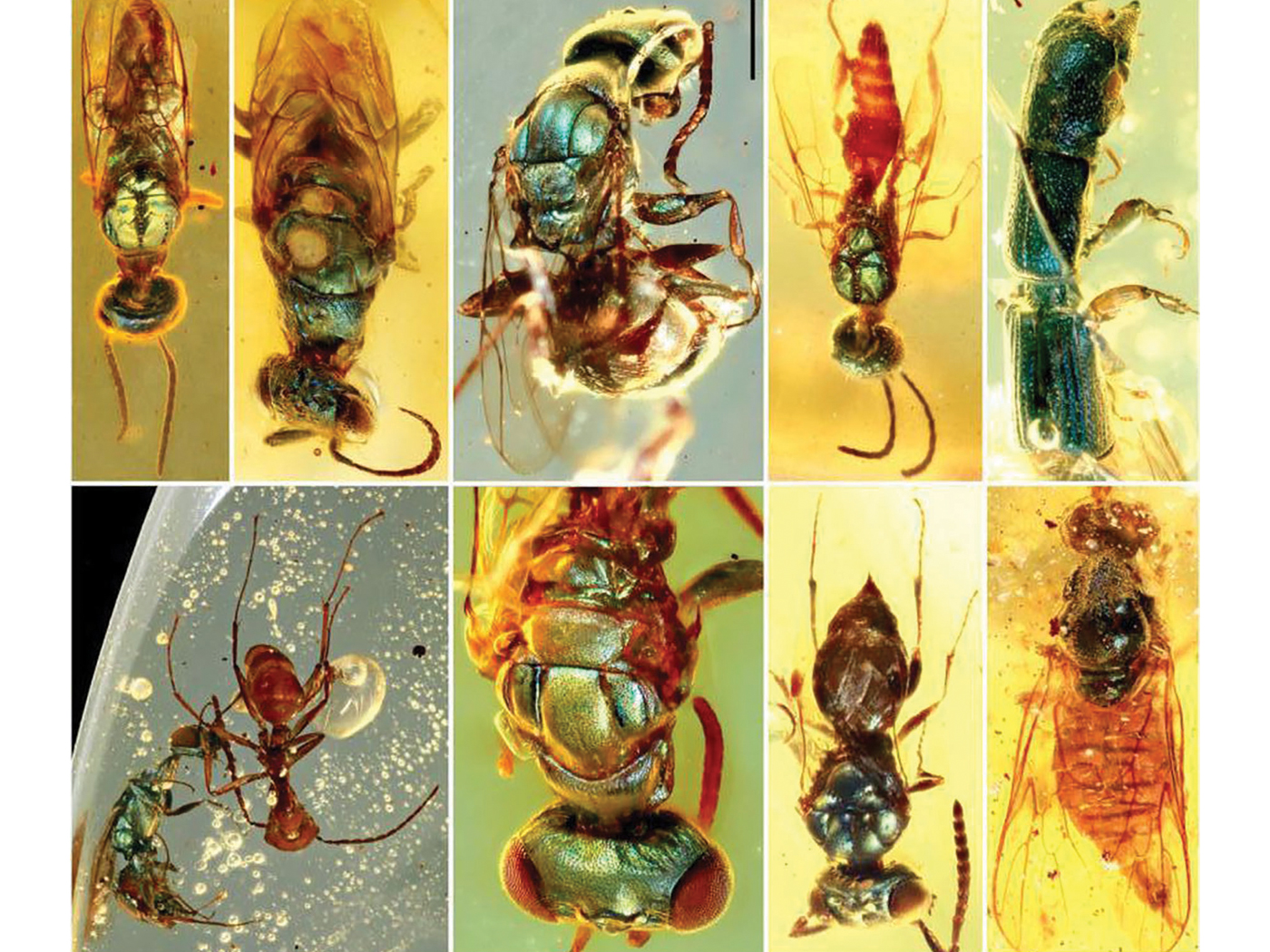Introduction
Several recent American presidents have openly supported creation thinking. A few "on the record" statements of these presidents in support of their belief in creationism are reviewed below.
President Dwight Eisenhower
Eisenhower's upbringing was "Steeped in Religion" by two devoutly religious parents (Bergman, 1998). Eisenhower stated that he was reared with "a deep Bible-centered faith" (Quoted in Gammon, 1969, pp. 3-4).
Eisenhower's religious background was River Brethren and a fellowship then called Bible Students. Both groups were strong creationists. Their first anti-Darwin book was an 1898 work titled The Bible Versus the Evolution Theory. In addition, the Bible Students published hundreds of articles that support creationism and are critical of Darwinism. Those who have studied Eisenhower's life conclude that he had an unshakable belief in the Bible teaching that God is the Creator and Sustainer of life (Hutchinson, 1954, p. 369; Bergman, 2000).
Eisenhower's worldview openly influenced his public statements. An example is his conclusion, based on his study of the founding fathers' writings, that America is a religious nation today because the country's fathers expressed their
full reliance on "the laws of nature and nature's God" and because they published before the world these self-evident truths: "that all men are created equal, that they are endowed by their Creator with certain unalienable rights. . . ." In contrast with this concept of the sacredness of life, modern atheistic dictatorships treat men as nothing more than animals or educated mules. How many materialistic psychologists and smart-alec professors sneer that men invented God in a childish search for security; yet, I have noticed that men in the foxholes or at the moment of death turn to some higher Power for comfort and courage (Quoted in Gammon, 1969, pp. 3-4, emphasis mine).
Eisenhower insisted that God had often intervened in response to his prayers. For example, he believed the numerous contingencies that all worked together in his life to allow him to destroy fascism and Nazism were not a result of chance, but rather God's will. Eisenhower strongly believed that God was with him in his battle against "Hitler and all that he stood for" (Eisenhower, 1967, p. 52).
President James Earl Carter
For Carter, religion was continually at the forefront of his presidency. Always more in agreement with Intelligent Design than creationism, he wrote that the evidence of the design argument was so persuasive that even for persons
without specific religious convictions . . . the awe-inspiring beauty of starlit sky or sunset, the emergence of a butterfly from a chrysalis, the industry of an ant, or the sprouting of a seed were adequate proofs of God's hand in our lives and in creation (2005, p. 48).
He added that he believed an "omnipotent Creator" created the "entire universe" (2005, p. 49). An example where he stressed the clear evidence for design in nature was in a 1989 letter to one of his "favorite writers on scientific subjects," Harvard Professor Stephen Jay Gould. Carter disagreed with Gould's conclusion that evolution was
like a tape going through a machine, with the results being attributable to a completely haphazard recording. I wrote him a private letter, expressing my belief that there had obviously been some logic or order in the process. He didn't respond directly, but subsequently quoted and slyly ridiculed my opinion in one of his monthly magazine articles (2005, pp. 49-50).
Carter added that "my own personal belief [was] that God created the universe" and not a blind watchmaker as taught by orthodox Darwinism.
President Ronald Reagan
During Reagan's 1967-1975 California governorship, the "state board of education had pushed to weaken the teaching of evolution and endorsed creationism" (Mooney, 2005, p. 36). A Science magazine editorial opined that
Reagan's sympathy with the creationists was common knowledge when he was governor. Reagan supported an unsuccessful 1972 suit brought by the state school board . . . to bring the teaching of creationism to public schools (Science, 1980, p. 1214).
During a 1980 press conference, presidential candidate Ronald Reagan was asked if he thought the theory of evolution should be taught in public schools. He answered that evolution is a
theory only, and it has in recent years been challenged in the world of science and is not yet believed in the scientific community to be as infallible as it once was believed. But if it was going to be taught in the schools, then I think that also the biblical theory of creation, which is not a theory but the biblical story of creation, should also be taught (Science, 1980, p. 1214).
Asked if he personally accepted the theory of evolution, Reagan replied: "I have a great many questions about it. I think that recent discoveries down through the years have pointed up great flaws in it" (Science, 1980, p. 1214).
After Reagan's election, several key administration members also supported teaching creation. Due to the opposition of mainline science to anything less than dogmatic teaching of Darwinism, though, they had to be circumspect. For example, Reagan's science adviser, George Keyworth, "refused to repudiate the teaching of creationism in public schools during his 1981 confirmation hearing." Reagan's Secretary of Education, William Bennett, also supported teaching of creationism. For example, in 1986 Bennett "declared that in his view, the selection of public school textbooks should involve the `judgment of the community,' a tacit nod to creationist forces at the local level" (Mooney, 2005, p. 36).
Mooney concludes that "The Reagan administration's sympathies with creationism signaled a new development for the Republican Party and conservatism more generally" (2005, p. 36). Reagan also wrote in a letter to a correspondent that certain quotes, evidently made in response to statements made by Paul Kurtz in The Humanist, that
Humanism can not in any fair sense of the word apply to one who still believes in God as the source and creator of the universe. Christian Humanism would be possible only for those who are willing to admit that they are atheistic Humanists. It surely does not apply to God intoxicated believers (Skinner, et al., 2003, p. 644).
Reagan then expressed his concern about teaching Humanism in public schools by paraphrasing John J. Dunphy from the Humanist magazine who wrote that "the battle for humankind's future will be waged and won in the public school classroom and the new faith of Humanism will replace the `rotting corpse of Christianity'." (Skinner, et al., 2003, p. 644). Some of Reagan's cabinet members also supported Reagan's view. For example, Reagan's Secretary of the Interior, James Watt, said that the issue in the Scopes trial
was not whether the doctrine of evolution should take the place of the Biblical account of Creation. The question was whether the theory of evolution could be discussed. . . . Scopes lost the trial. . . . Censorship was as wrong then as it is now. We believers in the Old Testament want the theories of both evolution and Creation taught. . . . Unfortunately, in many school systems, the liberals have now censored the teaching of Creation. Yet is censorship by liberals right and by conservatives wrong? (1985, pp. 109-110).
President George H. W. Bush
George H. W. Bush's writings also indicate that he accepted the creation worldview, and felt that Darwinism should be taught objectively in public schools. An example is Bush's statement about creationism made while campaigning, as summarized by the journal Church and State:
Creationism also gets a Bush nod. . . . the candidate says, "I'm not a scientist, but it seems to me that the Bible has an abundance of clues and evidence to help archeologists, astronomers and other scientists in their endless quest for knowledge. I wouldn't be a bit surprised if the Biblical account of creation and the scientific evidence of the origins of the universe will yet find common ground (Boston, 1988, p. 10).
President George W. Bush
When campaigning for President in 1999 Bush openly "supported the teaching of creationism alongside evolution in public schools" (Mooney, 2005, p. 9) and has also openly given support to creationism while in public office. In a Roundtable interview he gave on August 1, 2005, Bush was asked about his personal views on the "growing debate over evolution versus intelligent design" and if he thought "both should be taught in public schools." Bush answered "that decision should be . . . [up] to local school districts, but I felt like both sides ought to be properly taught. . . . so people can understand what the debate is about" (2005, p. 4). During his 2000 election campaign President Bush was quoted as saying that "on the issue of evolution, the verdict is still out on how God created the earth" (Dowd, 2005).
Both Democrats running against Bush, Albert Gore and Joseph Lieberman, supported Bush on this issue. Professor Gregory Paul noted that
Gore supported teaching both creationism and evolution, his running mate Joe Lieberman asserted that belief in a creator is instrumental to "secure the moral future of our nation, and raise the quality of life for all our people" (2005, p. 4).
Conclusion
It is clear from this review that at least four presidents and other high government officials openly supported the right to "teach the controversy" about the topic of origins and to avoid indoctrination in Darwinism. Several other presidents accepted the idea called Intelligent Design, the conclusion that evolution cannot fully explain the living world which displays clear evidence of intelligence.
References
Bergman, Jerry. 1998. Steeped in religion: President Eisenhower and the influence of the Jehovah's Witnesses. Kansas History 21 (3):148-167.
______. 2000. The influence of religion on President Eisenhower's upbringing. Journal of American and Comparative Culture 32 (4):89-107.
Boston, Rob. 1988. God, country, and the electorate. Church and State (October):8-15.
Bush, George H. W. 1990. Remarks to the National Academy of Sciences (April 23). Manuscript in George Bush Presidential Library and Museum.
Bush, George W. 2005. Roundtable interview. Washington Post (August 2).
Carter, Jimmy. 2005. Our endangered values: America's moral crisis. New York, NY: Simon and Schuster.
Dowd, Maureen. 2005. Inherit the windbags. New York Times (February 3).
______. 1967. At ease, stories I tell to friends. Garden City, NJ: Doubleday.
Gammon, Roland, ed. 1969. Eisenhower speech reprinted in All believers are brothers. New York: Doubleday.
Hutchinson, Paul. 1954. The President's religious faith. Christian Century (March 24):362-369, reprinted in Life. March 22:150-167.
Mooney, Chris. 2005. The Republican War on Science. New York: Basic Books.
Science 1980. Republican candidate picks fight with Darwin. Science 209:1214.
Paul, Gregory S. 2005. Cross-national correlations of quantifiable societal health with popular religiosity and secularism in the prosperous democracies. Journal of Religion and Society 7:1.
Skinner, Kiron K., Annelise Anderson, and Martin Anderson, eds. 2003. Reagan: A life in letters. New York: Free Press.
Watt, James G. (with Doug Wead). 1985. The courage of a conservative. New York: Simon and Schuster.
* Jerry Bergman is on the Biology faculty at Northwest State College in Ohio.


















